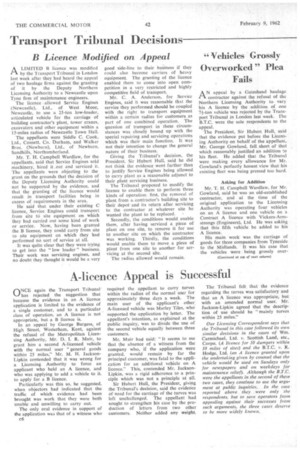Transport Tribunal Decisions
Page 38

If you've noticed an error in this article please click here to report it so we can fix it.
B Licence Modified on Appeal
A LIMITED B licence was modified rA by the Transport Tribunal in London last week after they had heard the appeal of two haulage firms against the granting of it by the Deputy Northern Licensing Authority to a Newcastle upon Tyne firm of maintenance engineers.
The licence allowed Service Engines (Newcastle), Ltd., of West Moor, Newcastle, to use a 25-ton low-loader, articulated vehicle for the carriage of building contractor's plant, tower cranes, excavators and other equipment within a 15-miles radius of Newcastle Town Hall.
The appellants were Siddle C. Cook, Ltd., Consett, Co. Durham, and Walker Bros. (Newburn), Ltd., of Newburn, SandhiIls, Northumberland.
Mr. T. H. Campbell Wardlaw, for the appellants, said that Service Engines sold machinery, hired it_out and serviced it. The appellants were objecting to the grant on the grounds that the decision of the Deputy Licensing Authority could not be supported by the evidence, and that the granting of the licence would result in transport facilities being in excess of requirements in the area.
He said that under their existing C licence, Service Engines could transport from site to site equipment on which they had carried out some kind of work or service. Now, having been granted the B licence, they could carry from site to site equipment on which they had performed no sort of service at all.
It was quite clear that they were trying to get into the "low loader" business. Their work was servicing engines, and no doubt they thought it would be a very good side-line to their business if they could also become carriers of heavy equipment. The granting of the licence enabled them to come into open competition in a very restricted and highly competitive field of transport.
Mr. C. A. Anderson, for Service Engines, said it was reasonable that the service they performed should be coupled with the right to transport equipment within a certain radius for customers as part of one combined operation. The question of transport in these circumstances was closely bound up with the special repairing and servicing operations which was their main function. It was not their intention to change the general nature of their business.
Giving the Tribunal's decision, the President, Sir Hubert Hull, said he did not think the evidence went further than to justify Service Engines being allowed to carry plant as a reasonable adjunct to their plant servicing business.
The Tribunal proposed to modify the licence to enable them to perform three kinds of operation: first, the removal of plant from a. contractor's building site to their depot and its return after servicing to the contractor at whatever site he wanted the plant to be replaced. • Secondly, the conditions would enable them, after having serviced a piece of plant on one site, to remove it for use to another site on which the contractor was working. Thirdly, the conditions would enable them to move a piece of plant from one site to another for servicing at the second site.
The radius allowed would remain.
















































































































